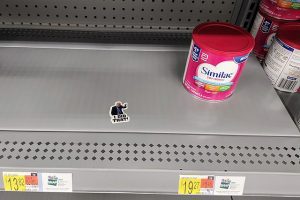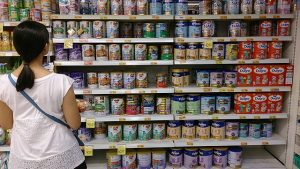In recent times, the issue of infant formula decline has become a concerning reality and affects many parents around the world. With growing formula demands, supply chain disruptions, and various other factors at play, accessing adequate and reliable baby formula has become increasingly challenging.

The United States had a serious newborn formula shortage in 2022 due to the 2021–2022 global supply chain crisis, a massive product recall when two babies allegedly died after drinking Abbott infant formula, import restrictions, and market concentration. In contrast to other food products, infant formula frequently lacks a suitable alternative as a source of nutrition for individuals who rely on it. In addition to babies, non-infant healthcare patients who need nasogastric feeding or have certain medical diseases have been affected by infant formula recalls.
Here are some recommendations for finding infant formula during a formula scarcity, as well as what you can do if you can’t locate any formula. Please consult your pediatrician if you have any concerns about your baby’s nutrition.
What Can You Do With Infant Formula Scarcity?
The infant formula shortage is a global issue. The infant formula crisis states that the demand for infant formula is rising while the supply is decreasing. As a parent, it is stressful to see no more milk to drink. Family Hype recommends the following tips in case you can’t find any infant formula near your home. Here are a few ideas to help you find the formula you’re looking for if there are supply chain issues:
Look In Less Populated Areas
What to do if there’s an infant formula shortage? Suppose you have the time, try to venture outside your usual search region to smaller towns and less apparent stores. To find the infant formula you’re searching for, try pharmacies, mom-and-pop businesses, store brands, food banks, and smaller retailers. You can usually find a lot at formula aisles from department stores and other store brands. Neighborhoods with fewer newborns or less densely inhabited may have greater supply availability. It couldn’t hurt to make some phone calls or take some small road trips to such locations.
Purchase From Trusted Online Shops
For online availability, contact the manufacturers directly. Instead of obtaining the formula from secondhand, unverified sources online, use trustworthy internet markets like Amazon or Walmart. There is concern that people would market unapproved formulations and take advantage of the opportunity. You should return to the firsthand distributors you’ve come to rely on.
Consult Your Baby’s Pediatrician’s Office
In times of supply chain issues, it’s good to consult a medical professional. Contact your pediatrician’s office if you’re unsure where to search for formula, or if you’re having a hard time finding infant formula. Don’t try making homemade products out of ingredients you just find online, consult your pediatrician first. They may be able to lead you on the appropriate path or inform you if they do have any extra formula on hand. But don’t be disheartened if your pediatrician doesn’t have formula on hand. It is not surprising that most pediatrician clinics have run out of supplies due to families phoning with the same question.
If you can’t find any infant formula or baby formula supply around, your best option is for your infant to drink breast milk instead. Breast milk or human milk is naturally produced by women and contains all the nutrients an infant needs. Breast milk is recommended for newborn babies instead of an infant formula or a cow’s milk formula because there’s a higher chance of getting NEC from drinking whole cow’s milk formula. Whole cow’s milk is also associated with lactose intolerance, elevated cholesterol, and more.
Encourage your child to drink breast milk often instead of cow’s milk-based formula types. If you’re looking for a replacement for human milk, avoid almond milk and soy milk formula for it doesn’t compare to the nutrients that you will be getting from human milk. If you’re planning to switch to another infant formula, do your research about it, or ask a professional if it’s advisable to take as much formula as the older one. It is better to consult a physician first before trying infant formula products, to ensure safety concerns and disease control. Prevention and disease control is much better than treatment.
Should You Take Breast Milk From People In Your Neighborhood Or Strangers?
Online community members provide breast milk and formula to mothers in need despite warnings from the Food and Drug Administration (FDA). However, doctors warn that this would be quite harmful to babies.
The primary concern is the mother’s sickness. Toxins she may have consumed, including medicines, pharmaceuticals, and other substances in her environment, could have entered the milk. These could then be given to the babies unknowingly. We’re also concerned about the storage method. Milk that sits at room temperature, in a refrigerator, or even in a freezer can disrupt the nutrient content and promote bacterial growth.
Doctors recommend instead going to a breast milk donor bank, just like the Human Milk Banking Association where mothers are tested for drugs, medicines, and illnesses. They also screen the milk for harmful bacteria to reduce the risk in babies and keep it at safe temperatures.
Can You Make Infant Milk?
- Concentrated milk comes from evaporated milk, commonly referred to as unsweetened condensed milk. It can become contaminated or have the wrong balance of nutrients if you mix it with water.


- The AAP does not advise using homemade baby formulations inspired by specialty formulas for similar reasons. Although homemade options were utilized in the past, newborns were exposed to numerous hazards after taking a homemade baby milk product.
- There are serious safety concerns regarding nutrient content and contamination in homemade infant recipes found online.
- In addition, making homemade infant formulations has risks that may affect your child. According to reports, several newborns fed homemade milk ended up in hospitals.
- This may have a detrimental impact on your child’s immune system and lead to infection. This development occurs in our circulatory system and gastrointestinal tract, where we have immune responses and good bacteria that grow and develop to assist and serve as a line of defense.
- Infants are more vulnerable to illnesses and contaminated products because their immune systems are still developing. And if you happen to pick up hazardous bacteria somewhere along the way, it might seriously impact your infant’s health and development.
- This can be deficient in nutrients. Babies require a lot of protein and fat to keep pace with their growing and developing bodies.
Are Imported Baby Formula Safe?
- The Food and Drug Administration (FDA) seeks to ensure that some imported baby product brands that haven’t been sold in the United States have safe production standards, labeling, and shipping. The very dependable European Food Safety Agency controls European infant formula like the Food and Drug Administration (FDA) does with American formula.
- The most crucial safety precaution while using imported baby milk brands is to carefully read the label. In the mixing instructions, many imported brands use milliliters (ml) rather than an ounce (oz). If your infant bottles don’t include mL scale markings, you might need to convert between ounces and milliliters. In addition, your infant is at risk if too much or too little water is used while mixing powder or concentrate.
- Choosing the appropriate imported milk brands that suit your kid’s age is also crucial. Stage 1 (during the first six months following birth, although typically used during the entire first year) and Stage 2 may be found in imported products (infants over six months of age).


FAQs:
Is Infant Formula Scarcity Getting Worse?
The situation regarding the baby’s formula shortages, influenced by the production issues at the largest infant formula manufacturer, is reflected in the sparsely stocked grocery store shelves and store shelves, affecting not only regular infant formula but also the supplies for the Special Supplemental Nutrition Program, indicating a worsening trend.
Can I Bottle Feed Breast Milk?
Is It OK To Only Breastfeed Within 3 Months?
Is It OK To Just Breastfeed At Night?
Why Is There Currently A Decline Of Infant Milk Supply?
The current shortages of infant formula are primarily due to supply chain disruptions and manufacturing issues, including a major recall from a key formula producer. The COVID-19 pandemic has also played a role, causing labor shortages and logistic challenges that have affected production and distribution. These factors have combined to create significant gaps in the availability of various types of infant formula, impacting families and caregivers globally. The shortages of infant formula are affecting the formula market, especially impacting the availability of specialized formula and powdered formula, leading to initiatives like Operation Fly Formula to alleviate the strain, particularly on low-income families who rely heavily on these essential products.
How Long Will The Infant Milk Supply Scarcity Last?
In addressing the duration of the infant formula shortages, experts in the formula industry suggest that while efforts are being made, such as invoking the Defense Production Act to ramp up production of nutritious infant formula, it’s uncertain how quickly these measures will restock the formula aisle to pre-shortage levels.
How Many Infants Died From Infant Milk Scarcity?
Due to the formula shortages, low-income parents and low-income women, who have had trouble finding formula following the production issues at Abbott Nutrition, one of the major formula makers, are under significant stress, though specific figures on the impact, such as the number of babies affected, are not readily available and would require data from entities like the Department of Human Services for accurate assessment.
Who Is The Most Affected By Infant Milk Scarcity?
The baby’s formula shortages, compounded by the FDA investigation into contaminated formula, have disproportionately impacted certain groups. Among those most affected are individuals reliant on formula to supplement or substitute milk supply, particularly participants in programs like the Women, Infants, and Children (WIC) nutrition program overseen by the National WIC Association and managed in part by the General Services Administration.
Why Is Infant Milk So Expensive?
What Is Baby Formula Made Of?
What Formulas Were Recalled?
Why Is Enfamil Out Of Stock?
How Long Do Infants Drink Formula?
Are Formula-Fed Babies Healthy?
What Are The 2 Disadvantages Of Formula Feeding?
Parent’s Helpful Resources During Crisis
Caring for your newborn during a formula shortage can be highly stressful and unpleasant, but there are various services available to assist you in getting through an infant formula shortage, including:
- WIC Waivers – The WIC program is a federally funded supplemental nutrition program that provides food vouchers to pregnant and postpartum women, breastfeeding women, infants, and children up to age five who are at nutritional risk. Some of the WIC benefits include breastfeeding support, nutrition information, and referrals.
- United Way- The United Way 211 is a free, 24-hour service that connects people in need with community services. It is a one-stop resource for information on all the services available in your community.
- Family Hype– We are dedicated to discussing all things related to the family unit as a whole. Here you’ll find information from parents and family members dedicated to building “hype” (or promoting) everything about the family unit.
Last Updated on April 12, 2023 by Rejie Salazar
DISCLAIMER (IMPORTANT): This information (including all text, images, audio, or other formats on FamilyHype.com) is not intended to be a substitute for informed professional advice, diagnosis, endorsement or treatment. You should not take any action or avoid taking action without consulting a qualified professional. Always seek the advice of your physician or other qualified health provider with any questions about medical conditions. Do not disregard professional medical advice or delay seeking advice or treatment because of something you have read here a FamilyHype.com.